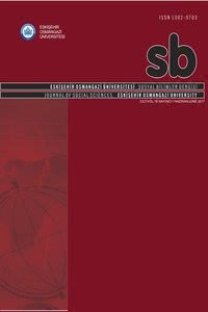REFİK SAYDAM HÜKÜMETLERİ DÖNEMİNDE TÜRKİYE’NİN EKONOMİ POLİTİKASI (1939-1942)
Dr. Refik SAYDAM başbakan olduktan kısa bir süre sonra, 1 Eylül 1939’da İkinci Dünya Savaşı başlamış, tüm Avrupa’yı saran savaş Türkiye’nin güvenliğini tehdit eder hale gelmiştir. Üretim araçlarının yetersizliği, nakliye ve dış alımda ortaya çıkan sıkıntılar sonucunda, arz talebi karşılayamaz hale gelmiştir. Böylece, Türkiye ekonomisi ağır bir enflasyonist baskı altına girmiştir. Bu araştırmada, Dr. Saydam ve Hükümetlerinin II. Dünya Savaşı’nın yıkıcı- yok edici savaş ortamında ekonomik faaliyetlerin sürdürülmesine yönelik “sıkı devletçi tavır” olarak adlandırılan karar ve uygulamaları, tarihsel belge ve bilgilerin ışığında değerlendirilmiştir. Devletin ekonomiye etkili bir biçimde müdahale etmesi, ekonomik sorunların çözümünde başarılı olamamış; temel gıda maddeleri karneye bağlanmıştır. Yazımızda incelenen; Saydam Hükümetlerinin izledikleri ekonomik politikalar ve uygulamaları Cumhuriyet Tarihi’nin en çok eleştirilen ve tarihsel bir yöntemle ayrıntılı bir biçimde ele alınmayan bir süreçtir. Bu dönemde, sosyo-ekonomik sıkıntılar yaşanmış olmakla beraber; Türkiye’de açlıktan ölenler olmadığı gibi; Çin ve Sovyetler Birliği’nde yaşanmış olanlara benzer, gerçek anlamda kıtlıklar da yaşanmamıştır.
Anahtar Kelimeler:
İkinci Dünya Savaşı ve Türkiye, Refik Saydam, Ekonomi Politikası
ECONOMIC OF TURKEY DURING DR. REFIK SAYDAM ADMINISTRATIONS (1939-1942)
Shortly after Dr. Refik Saydam assumed the post of Prime Minister, World War II broke out on September 1, 1939, and the war that shook entire Europe began threatening the safety of Turkey. As a result of the insufficient manufacturing means and troubles emerging in transportation and foreign trade, supply was then unable to meet the demand. Thus, Turkish economy was put under a severe inflationist pressure. In this research, decisions and practices of Dr. Saydam and his cabinet – described as “strict statist attitude” – for maintaining economic activities in a destructive war environment of the World War II are evaluated in the light of historical documents and information. This paper examines the historical process of economic policies and practices of Saydam government that was criticized but not considered in detail utilizing a historical method. An effective interference of Turkish state on economy did not prove to be successful, resulting in rationing of staple food items. Although socio-economic issues did come up during the this period, people did not die of hunger, and famine never struck the region in the literal sense, just as China and Soviet Union experienced at the time.
Keywords:
II. World War and Turkey, Refik Saydam, Economical Politics,
- Başlangıç: 2000
- Yayıncı: -
Sayıdaki Diğer Makaleler
TÜRKİYE’NİN BALKAN ÜLKELERİNE YAKINLAŞMA ÇALIŞMALARI: BALKAN PAKTI
Mehmet Ali Köseoğlu ve Elif Karabulut Temel, Elif KARABULUT TEMEL
1897 TÜRK-YUNAN SAVAŞININ BASINDA YER ALAN ŞİİRLERE YANSIMALARI
Elif TEMEL KARABULUT, Mehmet Ali KÖSEOĞLU
Abdullah Yılmaz, Yavuz Bozkurt ve Ferit İzci, Yavuz BOZKURT, Ferit İZCİ
REFİK SAYDAM HÜKÜMETLERİ DÖNEMİNDE TÜRKİYE’NİN EKONOMİ POLİTİKASI (1939-1942)
Mustafa Yahya Metintaş ve Mehmet Kayıran, Mehmet KAYIRAN
1897 Türk-Yunan Savaşının Basında Yer Alan Şiirlere Yansımaları
